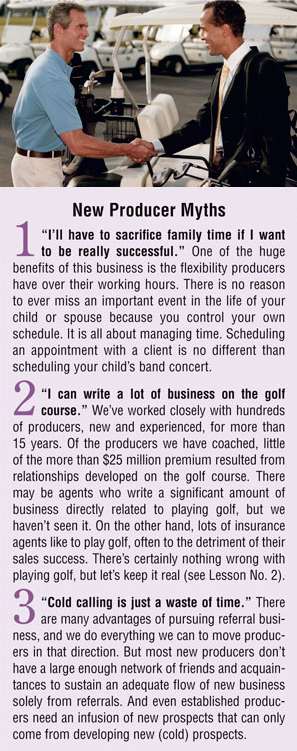 My partner and I have had the privilege of working closely with more than 1,300 new property-casualty insurance producers during the past 16 years. We carefully document their prospecting and sales activities for a year or more during scheduled 30-minute weekly phone coaching sessions. A few of these producers are extremely successful, some learned they were not an ideal fit for the business, and most are methodically building lucrative insurance careers. This is in an industry where some experts say two-thirds of the new entrants don't survive to the second year.
My partner and I have had the privilege of working closely with more than 1,300 new property-casualty insurance producers during the past 16 years. We carefully document their prospecting and sales activities for a year or more during scheduled 30-minute weekly phone coaching sessions. A few of these producers are extremely successful, some learned they were not an ideal fit for the business, and most are methodically building lucrative insurance careers. This is in an industry where some experts say two-thirds of the new entrants don't survive to the second year.
Agency owners sometimes complain that they “can't find young people who want to work hard” (our top producer of the past 16 years was just 6 months out of graduate school and living with his parents). Or they excuse the lack of new blood in the agency with, “My agency is located out in the country. We don't have enough business to sustain a new producer” (one of our top producers is located in Attica, Kan., population 626). Or they refuse to give an opportunity to an internal candidate by saying, “She's been a CSR for years. I don't see how she could make the transition” (another of our top producers was a CSR for 20 years).
Recommended For You
Want to continue reading?
Become a Free PropertyCasualty360 Digital Reader
Your access to unlimited PropertyCasualty360 content isn’t changing.
Once you are an ALM digital member, you’ll receive:
- Breaking insurance news and analysis, on-site and via our newsletters and custom alerts
- Weekly Insurance Speak podcast featuring exclusive interviews with industry leaders
- Educational webcasts, white papers, and ebooks from industry thought leaders
- Critical converage of the employee benefits and financial advisory markets on our other ALM sites, BenefitsPRO and ThinkAdvisor
Already have an account? Sign In Now
© 2025 ALM Global, LLC, All Rights Reserved. Request academic re-use from www.copyright.com. All other uses, submit a request to [email protected]. For more information visit Asset & Logo Licensing.








